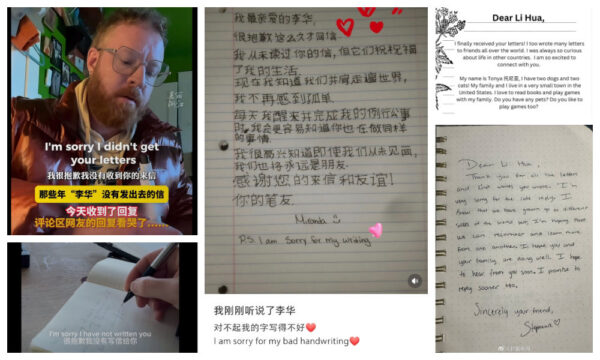Featured
China at the 2024 Paralympics: Golds, Champions, and Trending Moments
China’s standout moments, trending topics, and social media buzz from the 2024 Paralympics in Paris.
Published
5 months agoon

This article was first published by What’s on Weibo on
This is a ‘dynamic file’ offering updates on trending topics and buzz related to China’s participation in the 2024 Paralympics in Paris.
After China’s golden success at the 2024 Paris Olympics, it’s time for the Paralympics (残奥会) from 28 August 2024 – 8 September 2024. Although not as popular as the Olympics, the start of the Paralympics was still a popular topic on Chinese social media, with the topic hitting the top trending lists on August 28-29.
China has sent a delegation of 284 athletes—126 men and 158 women—to compete in 302 events across 19 sports. For 95 of these athletes, it’s their Paralympic debut.
This article is a ‘live file’ to track the various relevant hashtags and discussions on Chinese social media surrounding the events. If you don’t see any current updates, refresh the page or check back a day later to see new additions.
August 28
🔹 Celebrating the Start of the Paralympics
The opening ceremony of the 2024 Paralympics on August 28 took place at the Place de la Concorde, featuring 500 performers and a parade celebrating the 128 competing nations.
The Chinese delegation was led by two flag bearers: female wheelchair fencer Gu Haiyan (辜海燕) and male weightlifter Qi Yongkai (齐勇凯).
What particularly attracted attention on Chinese social media is how the renowned actor and martial arts hero Jackie Chan participated in the Paralympic torch relay (#成龙传递巴黎残奥会火炬#). He carried the Paralympic flame through the city, and also found some time to pose for selfies. People seemed to especially appreciate how popular Jackie Chan is, not just in China but also among fans abroad. This even made it to the number one trending topic on Chinese short video app Kuaishou.
August 29
🔹 China’s First Paralympic Gold
🥇 The first gold of the 2024 Paralympics for China was won by para-cyclist Li Zhangyu (李樟煜) in the Men’s 3000 m Pursuit. Beyond winning gold, he also broke a world record, smashing the previous record by crossing the line in a time of 3’31”338, 11 seconds faster than his compatriot Liang Weicong (梁伟聪), who finished with a time of 3’42”468 and took the silver medal.
For the 36-year-old Li, this marks his fifth Paralympic gold. He previously won the 3000m Individual Pursuit event at Rio 2016, and also earned a silver at London 2012 and a bronze at Tokyo 2020.

Chinese state media celebrating the first Paralympic gold.
Li Zhangyu was born in 1988 in Nanshan Village, Zhejiang. Diagnosed with cerebral palsy as a child, he had difficulty walking and often fell. To help him, his father bought him a small bicycle at the age of five or six. This marked the beginning of Li’s cycling journey, which would eventually lead him to become a historic Paralympic champion.
🔹 China’s Second Paralympic Gold
🥇 Wang Xiaomei (王小梅) became the second Paralympic athlete to win gold for China in the women’s C1-3 3000m individual pursuit.
The 24-year-old athlete from Yunnan’s Dali set a new world record in the women’s C3 3000m individual pursuit with a time of 3:44.660. In the final, where she claimed gold, she broke the world record again with a time of 3:41.692.

Wang Xiaomei has congenital cerebral palsy, which primarily affects the right side of her body. Cycling has significantly improved her physical condition. She is widely recognized as an inspiration for the way she has faced her challenges and persevered, which has led her to where she is today.
🔹 Two Swimming Gold
August 29 also marked the start of the swimming events, with 46 athletes from the Chinese team participating.
🥇🥇 Chinese swimmer Chen Yi (陈怡) secured gold in the women’s 50m freestyle S10, while Jiang Yuyan (蒋裕燕) claimed gold in the women’s 50m freestyle S6.
As a result, on the first day of the Paralympic events, the Chinese sports delegation earned a total of 4 gold medals and 1 silver medal.
August 30
🔹 Zhou Xia’s Three-Time Gold
🥇 Chinese para-athlete Zhou Xia (周霞) grabbed another gold for China on Friday. In the women’s T35 100m final, she claimed her medal with a season-best time of 13.58 seconds.

Zhou in Paris (left), Tokyo (middle) and Rio (right).
For Zhou, it’s her third Olympic success; she previously also grabbed gold in Rio and Tokyo. Zhou suffers from muscular atrophy in her left leg and left hand due to a car accident.
🔹 Yang Hong’s World Record
🥇 It seems that China is breaking many world records at this Paralympics. The 24-year-old Yang Hong (杨洪) clinched the gold medal in the Para Swimming Men’s 200m Individual Medley at the La Défense Arena in Paris.

August 31
🔹 China Going Strong: 20 Gold Medals on Day Three
On the third day of the Paralympics, Team China is going at full speed, as its gold medal count is already up to 20! This also includes a few athletes who grabbed gold on the 30th.

With 42 medals in total, China is topping the Olympic ranking.
September 1
🔹 “The Paralympics Are About the Limits of the Mind”
How does the general Chinese audience feel about the Paralympics? On Weibo and other platforms, the event is generally receiving less attention that the Olympics, also because it generally is less popular, with less commercial value.
Nevertheless, many people do follow the Paralympics and are impressed by the athletes. “The Olympics are about the limits of the body, the Paralympics are about the limits of the mind,” one Weibo user wrote.
Another Weibo blogger wrote: “The level of attention for the Paralympic events is still very low. It would be great if they could go trending a bit more. I bet many people don’t even know that the Paralympics take place after the Olympics. There’s only one gold medal for each event, but all those who participate in the Paralympic Games are heroes, winners, and champions in their own lives!”
September 2
🔹 From Small Village to Para Archery Gold
🥇 Zhang Tianxin (张天鑫), from a small village in Jiaxing, claimed gold in the Mixed Team W1 Para Archery event on September 2, alongside teammate Chen Minyi (陈敏仪). The pair defeated the Czech team. This victory comes shortly after Zhang also secured a bronze medal on September 1.
Having started archery in 2017, Zhang previously won gold at both the Tokyo Paralympics and the Hangzhou Asian Para Games.
On social media, his achievements are celebrated by Pinghu, the county-level city in Jiaxing where Zhang’s hometown, Shanqinggang village, is located. Pinghu also created a special film featuring Zhang, highlighting the strength of Para athletes.
September 4
🔹 The First gold for Henan: Wang Jingang
🥇 On September 4, Henan athlete Wang Jingang (王金刚) won the gold medal in the men’s 50m butterfly S6 final at the Paris Paralympics with a time of 31.24 seconds. This victory was celebrated on social media as it marked Henan’s first Paralympic gold. Henan is not typically among the top-performing provinces in the Olympics.

Wang Jingang (王金刚) taking the first Paralympic gold for Henan. Image via Zhengzhou Weibo account @郑州发布.
At the Paris Olympics, Chinese athletes from Guangdong Province won the most medals, followed by those from Shanghai, Shandong, Zhejiang, and Jiangsu.
It’s notable that during the Paralympics, even more than the Olympics, athletes’ hometowns are enthusiastically celebrating their Paris medals. Their achievements are viewed not just as national victories, but as local triumphs, bringing pride and joy to their communities.
This is evident in places like Henan, celebrating Wang Jingang, and Pinghu, honoring Zhang Tianxin, among many others. Rather than being solely seen as national heroes, these Para athletes are embraced as regional champions.
🔹 Who is four-time Paralympic champion Jiang Yuyan?
🥇 Jiang Yuyan (蒋裕燕) is one of the most discussed and popular Paralympic champions in China these days. She is also nicknamed the “Flying Fish with Broken Wings” (折翼飞鱼).
The Zhejiang-born athlete first claimed gold in Para Swimming in the women’s 50m freestyle, then went on to win another gold in the 50m butterfly. She added a third gold in the mixed event and secured a fourth on September 4th in the women’s 100m freestyle.

Jiang celebrated by Chinese official accounts.
Jiang began her professional athletic career in 2017, competing in national para events as part of the provincial team. She reportedly trains for at least six hours a day, with a key focus on maintaining balance, as she is missing her right arm and right leg.
As a preschooler, Jiang was involved in a car accident that resulted in the loss of her right hand and leg. To prevent muscle atrophy and aid her recovery, her mother enrolled her in a summer swimming class.

From the moment she entered the water, Jiang fell in love with swimming. She told reporters: “Fish have a tail, and I have a leg. In the water, I can enjoy freedom.”
September 5
🔹 Blind Soccer
While everyone’s focused on China’s national soccer team losing 0-7 to Japan in the 2026 World Cup Asian qualifiers, there’s a more successful story in Chinese soccer. China’s Blind Soccer team triumphed 1-0 against Morocco at the Paralympics, a victory that continues to be celebrated online despite the national team’s loss to Japan.
September 6
🔹 China’s Paralympic Success
With two days left before the end of the Paralympics, China is far ahead in the medal rankings with 186 medals, including 82 gold. The UK, in second place, lags behind with 100 medals, of which 42 are gold.
For both the Olympics and Paralympics, much of China’s sports success is often viewed by looking back at how far the country has come since it first participated in 1984.
In the Paralympics, China’s winning streak has continued since 2012, when Team China first took the top position.
Although China has seen great success in the Paralympics, and much like the Olympics, this success is tied to its rise on the global stage. However, it hasn’t led to more discussion on systemic issues around disability. The focus remains more on individuals overcoming challenges rather than addressing broader issues.[1]
—————————
End
—————————
By Manya Koetse
[1] Also see: Liu Yang & Zhongxuan Lin (2023) The national hero, the supercrip, and the self-reliant figure: Paralympic champions on China Central Television’s sports channel, Sport in Society, 26:9, 1477-1491, DOI: 10.1080/17430437.2022.2147064
Spotted a mistake or want to add something? Please let us know in comments below or email us. First-time commenters, please be patient – we will have to manually approve your comment before it appears.
©2024 Whatsonweibo. All rights reserved. Do not reproduce our content without permission – you can contact us at info@whatsonweibo.com.
Manya is the founder and editor-in-chief of What's on Weibo, offering independent analysis of social trends, online media, and digital culture in China for over a decade. Subscribe to gain access to content, including the Weibo Watch newsletter, which provides deeper insights into the China trends that matter. More about Manya at manyakoetse.com or follow on X.

You may like
China ACG Culture
“Black Myth: Wukong”: From Gaming Screens to the CMG Spring Festival Gala?
Published
2 days agoon
January 21, 2025
FROM THE WEIBO WATCH PREMIUM NEWSLETTER
Is Chinese game sensation ‘Black Myth Wukong’ making a jump from gaming screens to the CMG Spring Festival Gala? There’s already some online excitement over a potential performance at the biggest liveshow of the year.
The countdown to the most-watched show of the year has begun. On January 29, the Year of the Snake will be celebrated across China, and as always, the CMG Spring Festival Gala, broadcast on CCTV1, will air on the night leading up to midnight on January 28.
Rehearsals for the show began last week, sparking rumors and discussions about the must-watch performances this year. Soon, the hashtag “Black Myth: Wukong – From New Year’s Gala to Spring Festival Gala” (#黑神话悟空从跨晚到春晚#) became a topic of discussion on Weibo, following rumors that the Gala will feature a performance based on the hugely popular game Black Myth: Wukong.
Three weeks ago, a 16-minute-long Black Myth: Wukong performance already was a major highlight of Bilibili’s 2024 New Year’s Gala (B站跨年晚会). The show featured stunning visuals from the game, anime-inspired elements, special effects, spectacular stage design, and live song-and-dance performances. It was such a hit that many viewers said it brought them to tears. You can watch that show on YouTube here.
While it’s unlikely that the entire 16-minute performance will be included in the Spring Festival Gala (it’s a long 4-hour show but maintains a very fast pace), it seems highly possible that a highlight segment of the performance could make its way to the show.
Recently, Black Myth: Wukong was crowned 2024’s Game of the Year at the Steam Awards. The game is nothing short of a sensation. Officially released on August 20, 2024, it topped the international gaming platform Steam’s “Most Played” list within hours of its launch. Developed by Game Science, a studio founded by former Tencent employees, Black Myth: Wukong draws inspiration from the classic Chinese novel Journey to the West. This legendary tale of heroes and demons follows the supernatural monkey Sun Wukong as he accompanies the Tang Dynasty monk Xuanzang on a pilgrimage to India to retrieve Buddhist scriptures. The game, however, focuses on Sun Wukong’s story after this iconic journey.
The success of Black Myth: Wukong cannot be overstated—I’ve also not seen a Chinese video game be this hugely popular on social media over the past decade. Beyond being a blockbuster game it is now widely regarded as an impactful Chinese pop cultural export that showcases Chinese culture, history, and traditions. Its massive success has made anything associated with it go viral—for example, a merchandise collaboration with Luckin Coffee sold out instantly.
If Black Myth: Wukong does indeed become part of the Spring Festival Gala, it will likely be one of the most talked-about and celebrated segments of the show. If it does not come on, which we would be a shame, we can still see a Black Myth performance at the pre-recorded Fujian Spring Festival Gala, which will air on January 29.

Lastly, if you’re not into video games and not that interested in watching the show, I still highly recommend that you check out the game’s music. You can find it on Spotify (link to album). It will also give you a sense of the unique beauty of Black Myth: Wukong that you might appreciate—I certainly do.
By Manya Koetse
(follow on X, LinkedIn, or Instagram)
Spotted a mistake or want to add something? Please let us know in comments below or email us. First-time commenters, please be patient – we will have to manually approve your comment before it appears.
©2025 Whatsonweibo. All rights reserved. Do not reproduce our content without permission – you can contact us at info@whatsonweibo.com.
China Digital
“Dear Li Hua”: The TikTok/Xiaohongshu Honeymoon Explained
As American ‘TikTok Refugees’ flock to China’s Xiaohongshu (Rednote), their encounter with ‘Li Hua’ strikes a chord in divided times.
Published
4 days agoon
January 20, 2025
FROM THE WEIBO WATCH PREMIUM NEWSLETTER
China’s Xiaohongshu (Rednote) has seen an unprecedented influx of foreign “TikTok refugees” over the past week, giving rise to endless jokes. But behind this unexpected online migration lie some deeper themes—geopolitical tensions, a desire for cultural exchange, and the unexpected role of the fictional character Li Hua in bridging the divide.
Imagine you are Li Hua (李华), a Chinese senior high school student. You have a foreign friend, far away, in America. His name is John, and he has asked you for some insight into Chinese Spring Festival, for an upcoming essay has to write for the school newspaper. You need to write a reply to John, in which you explain more about the history of China’s New Year festival and the traditions surrounding its celebrations.
This is the kind of writing assignment many Chinese students have once encountered during their English writing exams in school during the Gaokao (高考), China’s National College Entrance Exams. The figure of ‘Li Hua’ has popped up on and off during these exams since at least 1995, when Li invited foreign friend ‘Peter’ to a picnic at Renmin Park.
Over the years, Li Hua has become somewhat of a cultural icon. A few months ago, Shangguan News (上观新闻) humorously speculated about his age, estimating that, since one exam mentioned his birth year as 1977, he should now be 47 years old—still a high school student, still helping foreign friends, and still introducing them to life in China.

Li Hua: the connector, the helper, the icon.
This week, however, Li Hua unexpectedly became a trending topic on social media—in a week that was already full of surprises.
With a TikTok ban looming in the US (delayed after briefly taking effect on Sunday), millions of American TikTok users began migrating to other platforms this month. The most notable one was the Chinese social media app Xiaohongshu (now also known as Rednote), which saw a massive influx of so-called “TikTok refugees” (Tiktok难民). The surge propelled Xiaohongshu to the #1 spot in app stores across the US and beyond.
This influx of some three million foreigners marked an unprecedented moment for a domestic Chinese app, and Xiaohongshu’s sudden international popularity has brought both challenges and beautiful moments. Beyond the geopolitical tension between the US and China, Chinese and American internet users spontaneously found common ground, creating unique connections and finding new friends.
While the TikTok/Xiaohongshu “honeymoon” may seem like just a humorous trend, it also reflects deeper, more complex themes.
✳️ National Security Threat or Anti-Chinese Witchhunt?
At its core, the “TikTok refugee” trend has sprung from geopolitical tensions, rivalry, and mutual distrust between the US and China.
TikTok is a wildly popular AI-powered short video app by Chinese company ByteDance, which also runs Douyin, the Chinese counterpart of the international TikTok app. TikTok has over 170 million users in the US alone.
A potential TikTok ban was first proposed in 2020, amid escalating US-China tensions. President Trump initiated the move, citing security and data concerns. In 2024, the debate resurfaced in global headlines when President Biden signed the “Protecting Americans from Foreign Adversary Controlled Applications Act,” giving ByteDance nine months to divest TikTok or face a US ban.
TikTok, however, has continuously insisted it is apolitical, does not accept political promotion, and has no political agenda. Its Singaporean CEO Shou Zi Chew maintains that ByteDance is a private business and “not an agent of China or any other country.”
🇺🇸 From Washington’s perspective, TikTok is viewed as a national and personal security threat. Officials fear the app could be used to spread propaganda or misinformation on behalf of the Chinese Communist Party.
🇨🇳 Beijing, meanwhile, criticizes the ban as an act of “bullying,” accusing the US of protectionism and attempting to undermine China’s most successful internet companies. They argue that the ban reflects America’s inability to compete with the success of Chinese digital products, labeling the scrutiny around TikTok as a “witch hunt.”

Political cartoon about the American “witchhunt” against TikTok, shared on Weibo in 2023, also published on Twitter by Lianhe Zaobao.
“This will eventually backfire on the US itself,” China’s Foreign Ministry spokesperson Wang Wenbin predicted in 2024.
Wang turned out to be quite right, in a way.
When it became clear in mid-January that the ban was likely to become a reality, American TikTok users grew increasingly frustrated and angry with their government. For many of these TikTok creators, the platform is not just a form of entertainment—it has become an essential part of their income. Some directly monetize their content through TikTok, while others use it to promote services or products, targeting audiences that other platforms like Facebook, Instagram, or X can no longer reach as effectively.
Initially, the mass migration of American users to Xiaohongshu was a symbolic protest against US policies. Users advocated for the right to choose their preferred social media, and voiced their frustration at how their favorite app had become a pawn in US-China geopolitical tensions. Rejecting the narrative that “data must be protected from the Chinese,” many pointed out that privacy concerns were equally valid for US-based platforms. As an act of playful political defiance, these users downloaded Xiaohongshu to demonstrate they didn’t fear the government’s warnings about Chinese data collection.
(If they had the option, by the way, they would have installed Douyin—the actual Chinese version of TikTok—but it is only available in Chinese app stores, whereas Xiaohongshu is accessible in international stores, so it was picked as ‘China’s version of TikTok.’)
Xiaohongshu is actually not the same as TikTok at all. Founded in 2013, Xiaohongshu (literal translation: Little Red Book) is a popular app with over 300 million users that combines lifestyle, travel, fashion, and cosmetics with e-commerce, user-generated content, and product reviews. Like TikTok, it offers personalized content recommendations and scrolling videos, but is otherwise different in types of engagement and being more text-based.
As a Chinese app primarily designed for a domestic audience, the sudden wave of foreign users caused significant disruption. Xiaohongshu must adhere to the guidelines of China’s Cyberspace Administration, which requires tight control over information flows. The unexpected influx of foreign users undoubtedly created challenges for the company, not only prompting them to implement translation tools but also recruiting English-speaking content moderators to manage the new streams of content. Foreigners addressing sensitive political issues soon found their accounts banned.
Of course, there is undeniable irony in Americans protesting government control by flocking to a Chinese app functioning within an internet system that is highly controlled by the government—a move that sparked quite some debate and criticism as well.
✳️ The Sino-American ‘Dear Li Hua’ Moment
While the initial hype around Xiaohongshu among TikTok users was political, the trend quickly shifted into a moment of cultural exchange. As American creators introduced themselves on the platform, Chinese users gave them a warm welcome, eager to practice their English and teach these foreign newcomers how to navigate the app.
Soon, discussions about language, culture, and societal differences between China and the US began to flourish. Before long, “TikTok refugees” and “Xiaohongshu natives” were collaborating on homework assignments, swapping recipes, and bonding through humor.
For instance, Chinese users jokingly asked the “TikTok refugees” to pay a “cat tax” for seeking refuge on their platform, which American users happily fulfilled by posting adorable cat photos. American users, in turn, joked about becoming best friends with their “Chinese spies,” playfully mocking their own government’s fears about Chinese data collection.

The newfound camaraderie sparked creativity, as users began generating humorous images celebrating the bond between American and Chinese netizens—like Ronald McDonald cooking with the Monkey King or the Terra Cotta Soldier embracing the Statue of Liberty. Later, some images even depicted the pair welcoming their first “baby.”

🇺🇸 At the same time, it became clear just how little Americans and Chinese truly know about each other. Many American users expressed surprise at the China they discovered through Xiaohongshu, which contrasted sharply with negative portrayals they’ve seen in the media. While some popular US narratives often paint Chinese citizens as “brainwashed” by their government, many TikTok users began to reflect on how their own perspectives had been shaped—or even “manipulated”—by their media and government.
🇨🇳 For Chinese users, the sudden interaction underscored their digital isolation. Over the past 15 years, China has developed its own tightly regulated digital ecosystem, with Western platforms like Facebook, Twitter, Instagram, and YouTube inaccessible in the mainland. While this system offers political and economic advantages, it has left many young Chinese people culturally hungry for direct interaction with foreigners—especially after years of reduced exchange caused by the pandemic, trade tensions, and bilateral estrangement. (Today, only some 1,100 American students are reportedly studying in China.)
The enthusiasm and eagerness displayed by American and Chinese Xiaohongshu users this week actually underscores the vacuum in cultural exchange between the two nations.
As a result of the Xiaohongshu migration, language-learning platform Duolingo reported a 216% rise in new US users learning Mandarin—a clear sign of growing interest in bridging the US-China divide.
Mourning the lack of intercultural communication and celebrating this unexpected moment of connection, Xiaohongshu users began jokingly asking Americans if they had ever received their “Li Hua letters.”
What started as some lighthearted remarks evolved into something much bigger as Chinese users dug up their old Gaokao exam papers and shared the letters they had written to their imaginary foreign friends years ago. These letters, often carefully stored in drawers or organizers, were posted with captions like, “Why didn’t you reply?” suggesting that Chinese students had been trying to reach out for years.

Example letters on Xiaohongshu: ‘Li Hua’ writing to foreign friends.
The story of ‘Li Hua’ and the replies he never received struck a chord with American Tiktok users. One user, Debrah.71, commented:
“It was the opposite for us in the USA. When I was in grade school, we did the same thing—we had foreign pen pals. But they did respond to our letters.”
Then, something extraordinary happened: Americans started replying to Li Hua.
One user, Douglas (@neonhotel), posted a heartfelt video of him writing a letter to Li Hua:
📝”Dear Li Hua, I’m sorry I didn’t get your letters. I understand you’ve been writing me for a long time, but now I’m here to reply. Hello, from your American friend. I hope you’re well. Life here is pretty normal—we go to work, hit the gym, eat dinner, watch TV. What about you? Please write back. I’m sorry I didn’t reply before, but I’m here now. Your friend, Douglas.”
Another user, Tess (@TessSaidThat), wrote:
📝”Dear Li Hua, I hope this letter finds you well. I’m so sorry my response is so late. My government never delivered your letters. Instead, they told me you didn’t want to be my friend. Now I know the truth, and I can’t wait to visit. Which city should I visit first? With love, Tess.”

Examples of Dear Li Hua letters.
Other replies echoed similar sentiments:
📝”Dear Li Hua, I’m sorry the world kept us apart.”
📝”I know we don’t speak the same language, but I understand you clearly. Your warmth and genuine kindness transcend every barrier.”
📝”Did you achieve your dreams? Are you still practicing English? We’re older now, but wherever we are, happiness is what matters most.”
These exchanges left hundreds of users—both Chinese and American, young and old, male and female—teary-eyed. In a way, it’s the emotional weight of the distance—represented by millions of unanswered letters—that resonated deeply with both “TikTok refugees” and “Xiaohongshu natives.”

Emotional responses to the Li Hua letters.
The letters seemed to symbolize the gap that has long separated Chinese and American people, and the replies highlighted the unusual circumstances that brought these two online communities together. This moment of genuine cultural exchange made many realize how anti-Chinese, anti-American sentiments have dominated narratives for years, fostering misunderstandings.

Xiaohongshu commenter.
On the Chinese side, many people expressed how emotional it was to see Li Hua’s letters finally receiving replies. Writing these letters had been a collective experience for generations of Chinese students, creating messages to imaginary foreign friends they never expected to meet.
Receiving a reply wasn’t just about connection; it was about being truly seen at a time when Chinese people often feel underrepresented or mischaracterized in global contexts. Some users even called the replies to the Li Hua letters a “historical moment.”
✳️ Unity in a Time of Digital Divide
Alongside its political and cultural dimensions, the TikTok/Xiaohongshu “honeymoon” also reveals much about China and its digital environment. The fact that TikTok, a product of a Chinese company, has had such a profound impact on the American online landscape—and that American users are now flocking to another Chinese app—showcases the strength of Chinese digital products and the growing “de-westernization” of social media.
Of course, in Chinese official media discourse, this aspect of the story has been positively highlighted. Chinese state media portrays the migration of US TikTok users to Xiaohongshu as a victory for China: not only does it emphasize China’s role as a digital superpower and supposed geopolitical “connector” amidst US-China tensions, but it also serves as a way of mocking US authorities for the “witch hunt” against TikTok, suggesting that their actions have ultimately backfired—a win-win for China.
The Chinese Communist Party’s Publicity Department even made a tongue-in-cheek remark about Xiaohongshu’s sudden popularity among foreign users. The Weibo account of the propaganda app Study Xi, Strong Country, dedicated to promote Party history and Xi Jinping’s work, playfully suggested that if Americans are using a Chinese social media app today, they might be studying Xi Jinping Thought tomorrow, writing: “We warmly invite all friends, foreign and Chinese, new and old, to download the ‘Big Red Book’ app so we can study and make progress together!”
Perhaps the most positive takeaway from the TikTok/Xiaohongshu trend—regardless of how many American users remain on the app now that the TikTok ban has been delayed—is that it demonstrates the power of digital platforms to create new, transnational communities. It’s unfortunate that censorship, a TikTok ban, and the fragmentation of global social media triggered this moment, but it has opened a rare opportunity to build bridges across countries and platforms.
The “Dear Li Hua” letters are not just personal exchanges; they are part of a larger movement where digital tools are reshaping how people form relationships and challenge preconceived notions of others outside geopolitical contexts. Most importantly, it has shown Chinese and American social media users how confined they’ve been to their own bubbles, isolated on their own islands. An AI-powered social media app in the digital era became the unexpected medium for them to share kind words, have a laugh, exchange letters, and see each other for what they truly are: just humans.
As millions of Americans flock back to TikTok today, things will not be the same as before. They now know they have a friend in China called Li Hua.
By Manya Koetse
(follow on X, LinkedIn, or Instagram)
Spotted a mistake or want to add something? Please let us know in comments below or email us. First-time commenters, please be patient – we will have to manually approve your comment before it appears.
©2025 Whatsonweibo. All rights reserved. Do not reproduce our content without permission – you can contact us at info@whatsonweibo.com.
What’s on Weibo Chapters
Subscribe

“Black Myth: Wukong”: From Gaming Screens to the CMG Spring Festival Gala?

“Dear Li Hua”: The TikTok/Xiaohongshu Honeymoon Explained

TikTok Refugees, Xiaohongshu, and the Letters from Li Hua

15 Years of Weibo: The Evolution of China’s Social Media Giant

Introducing What’s on Weibo Chapters

The Price of Writing Smut: Inside China’s Crackdown on Erotic Fiction

Controversial Wanghong Livestreamers Are Becoming a Weibo Staple in China

Weibo Watch: “Comrade Trump Returns to the Palace”

The ‘Cycling to Kaifeng’ Trend: How It Started, How It’s Going

Hu Xijin’s Comeback to Weibo

Our Picks: Top 10 Chinese Buzzwords and Phrases of 2024 Explained

The Viral Bao’an: How a Xiaoxitian Security Guard Became Famous Over a Pay Raise

Why Chinese Hit Movie “Her Story” is ‘Good Stuff’: Stirring Controversy and Celebrating Female Perspectives

Chiung Yao’s Suicide Farewell Letter: An English Translation

12-Year-Old Girl from Shandong Gets Infected with HPV: Viral Case Exposes Failures in Protecting Minors
Get in touch
Would you like to become a contributor, or do you have any tips or suggestions? Get in touch here!
Popular Reads
-

 China Insight9 months ago
China Insight9 months agoThe Tragic Story of “Fat Cat”: How a Chinese Gamer’s Suicide Went Viral
-

 China Music10 months ago
China Music10 months agoThe Chinese Viral TikTok Song Explained (No, It’s Not About Samsung)
-

 China Insight11 months ago
China Insight11 months agoThe ‘Two Sessions’ Suggestions: Six Proposals Raising Online Discussions
-

 China Digital8 months ago
China Digital8 months agoChina’s 2024 Gaokao Triggers Online Discussions on AI




